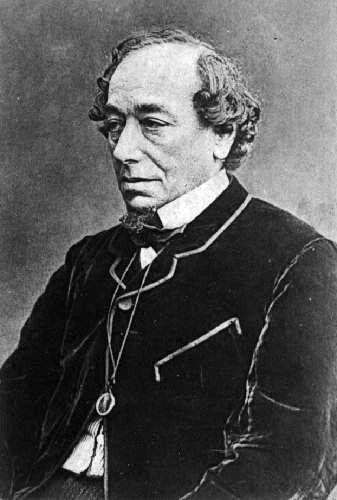Benjamin Disraeli frasi celebri
citato in Nicola Martella, Offensiva intorno a Gesù, vol II, Punto a croce 2000
Origine: Citato in Curzio Nitoglia, Per padre il diavolo: un'introduzione al problema ebraico secondo la tradizione cattolica, Barbarossa, 2002, p. 208.
Benjamin Disraeli Frasi e Citazioni
“La gioventù è un agire da sciocchi, la maturità una lotta, la vecchiaia un rimpianto.”
Origine: Citato in Focus, n. 115, p. 170.
“La delusione della maturità segue l'illusione della gioventù.”
Origine: Citato in Focus n. 67, p. 169.
“[Ultime parole famose, nel 1858] Il canale di Suez? Assolutamente impossibile da realizzare.”
Origine: Citato in Focus n. 97, p. 188.
“Quel che è delitto fra la moltitudine è soltanto un vizio fra i pochi.”
da Tancred, or the New Crusade, 1847
“Tutto è razza e non c'è altra verità.”
1847, vol. I, p. 169; citato in Losurdo 2005, p. 267
“Un governo conservatore è ipocrisia organizzata.”
dal discorso alla Camera dei Comuni del 17 marzo 1845
“Un politico usa i dati come un ubriaco il lampione: non per la luce ma per il sostegno.”
Origine: Citato in La settimana enigmistica, n. 4102, pag. 12
Benjamin Disraeli: Frasi in inglese
Origine: Speech in the House of Lords (20 February 1877), cited in William Flavelle Monypenny and George Earle Buckle, The Life of Benjamin Disraeli, Earl of Beaconsfield. Volume II. 1860–1881 (London: John Murray, 1929), p. 994.
“The sweet simplicity of the three per cents.”
Origine: Books, Coningsby (1844), Endymion (1880), Ch. 96. Compare: "The elegant simplicity of the three per cents", Lord Stowell, in Lives of the Lord Chancellors (Campbell), Vol. x, Chap. 212.
Origine: Upon hearing of the death of Napoléon, Prince Imperial of the House of Bonaparte in Africa (1879); cited in James Anthony Froude, Lord Beaconsfield (1890), p. 213.
Origine: Letter to a working men's club (1867), quoted in William Flavelle Monypenny and George Earle Buckle, The Life of Benjamin Disraeli, Earl of Beaconsfield. Volume II. 1860–1881 (London: John Murray, 1929), p. 297.
Origine: Letter to Lord John Manners, referring to the tactics of Prime Minister Sir Robert Peel (17 December 1846), cited in William Flavelle Monypenny and George Earle Buckle, The Life of Benjamin Disraeli, Earl of Beaconsfield (Vol. 2) (1913), p. 337-338.
“Candour is the brightest gem of criticism.”
Isaac D'Israeli, The Curiosities of Literature, "Literary Journals".
Misattributed, Isaac D'Israeli
“In politics nothing is contemptible.”
Book VI, Chapter 4.
Books, Coningsby (1844), Vivian Grey (1826)
Speech http://hansard.millbanksystems.com/commons/1849/feb/01/address-in-answer-to-the-speech in the House of Commons (1 February 1849).
1840s
Book V, Chapter 1.
Books, Coningsby (1844), The Young Duke (1831)
“The sense of existence is the greatest happiness.”
Part 3, Chapter 1.
Books, Coningsby (1844), Contarini Fleming (1832)
“He was fresh and full of faith that "something would turn up."”
Bk. III, Ch. 6.
Books, Coningsby (1844), Tancred (1847)
Speech http://hansard.millbanksystems.com/commons/1844/feb/16/state-of-ireland-adjourned-debate-fourth in the House of Commons (16 February 1844).
1840s
“When little is done, little is said; silence is the mother of truth.”
Bk. IV, Ch. 4.
Books, Coningsby (1844), Tancred (1847)
“Protection is not a principle, but an expedient.”
Speech http://hansard.millbanksystems.com/commons/1845/mar/17/agricultural-interest in the House of Commons (17 March 1845).
1840s
Origine: Speech http://hansard.millbanksystems.com/commons/1863/feb/05/address-to-her-majesty-on-the-lords in the House of Commons (5 February 1863).
1830s
Variante: Yes, I am a Jew, and when the ancestors of the right honorable gentleman were brutal savages in an unknown island, mine were priests in the temple of Solomon
Origine: Reply to a taunt by Daniel O'Connell http://www.victorianweb.org/history/pms/dizzy.html
Origine: Early appearance in The Russian Mephistopheles, Hunterberg, Max, 105-106, 1909, Glasgow, John J. Rae https://archive.org/details/russianmephistop00huntiala/page/106/mode/2up,
“Where knowledge ends, religion begins.”
Remark, attributed in John Gordon Stewart Drysdale and John James Drysdale, The Protoplasmic Theory of Life (1874), p. 279 (note).
Sourced but undated
Speech http://hansard.millbanksystems.com/commons/1846/may/15/corn-importation-bill-adjourned-debate in the House of Commons (15 May 1846).
1840s
“To govern men, you must either excel them in their accomplishments, or despise them.”
Letter to his father from Malta (25 August 1830), cited in Lord Beaconsfield's Letters, 1830-1852 (1882), p. 32
1830s
“We should never lose an occasion. Opportunity is more powerful even than conquerors and prophets.”
Tancred, Chapter 46.
Books, Coningsby (1844), Tancred (1847)
“At present the peace of the world has been preserved, not by statesmen, but by capitalists.”
Origine: Letter to Mrs. Sarah Brydges Willyams (17 October 1863), quoted in William Flavelle Monypenny and George Earle Buckle, The Life of Benjamin Disraeli, Earl of Beaconsfield. Volume II. 1860–1881 (London: John Murray, 1929), p. 73
“Everyone likes flattery, and when you come to Royalty you should lay it on with a trowel.”
In a letter to Matthew Arnold, as quoted in Stanley Weintraub, Victoria. Biography of a queen (1987), p. 412.
Sourced but undated
Isaac D'Israeli, Curiosities of Literature, "Quotation".
Misattributed, Isaac D'Israeli
“Seeing much, suffering much, and studying much, are the three pillars of learning.”
A Welsh triad cited in A Vindication of the Genuineness of the Ancient British Poems of Aneurin, Taliesin, Llywarch Hen, and Merdin (1803), by Sharon Turner, reads, "The three pillars of learning; seeing much, suffering much, and studying much". This was quoted from Turner by Isaac D'Israeli in his The Amenities of Literature (1841) and, through the confusion of father with son, has come to be falsely attributed to Benjamin Disraeli.
Misattributed
“If it is not necessary to change, it is necessary not to change.”
Attributed to Edmund Burke, to William Gerard Hamilton, to George Bernard Shaw, to John F. Kennedy (who quoted it) and to Benjamin Disraeli, it was actually said by Lucius Cary, 2nd Viscount Falkland in a speech in the House of Commons on 1641-11-22.
Misattributed
Origine: Speech http://hansard.millbanksystems.com/commons/1871/aug/08/third-reading in the House of Commons (8 August 1871).
